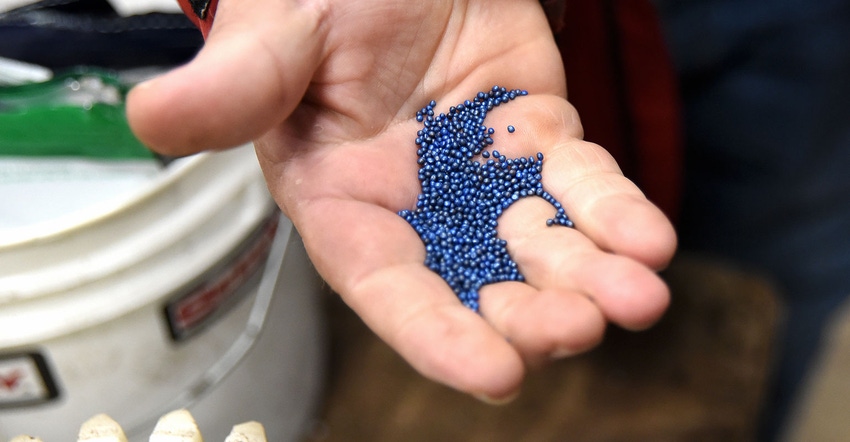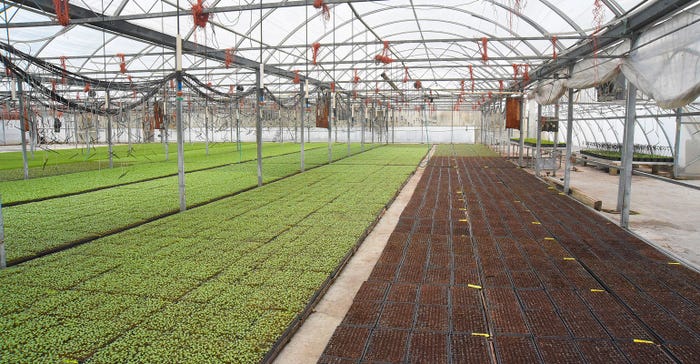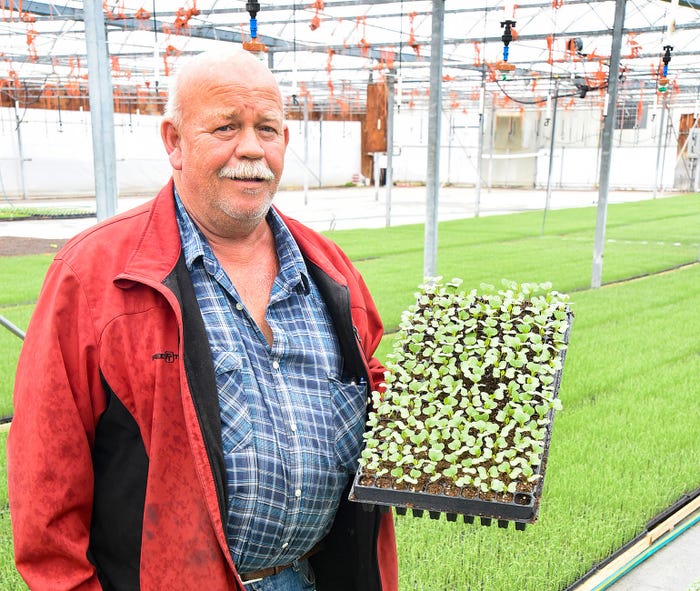April 23, 2020

A proof-of-concept project funded by the New York Farm Viability Institute in 2018 established the foundation for Zymtronix Catalytic Systems Inc., a Cornell University start-up business in Ithaca, N.Y., to field test its patented enzyme immobilization technology for coating seeds to reduce bacterial and fungal infections.
“The enzyme system we use is naturally occurring in saliva and milk, and naturally detrimental to micro-organisms, and allows the controlled release of potent free-radicals onto the seeds to combat a broad spectrum of bacteria and fungi,” says Marie Donnelly, Zymtronix bioengineering lead.
A grant from the New York Farm Viability Institute allowed Donnelly to move her in-house trials to the commercial-scale greenhouses of Daniel “Pudgie” Riner at Triple P Farms in Oakfield, N.Y.
“For Phase 1 out-of-laboratory trial with our prototype seed, we wanted to work with a commercial-scale grower to evaluate how well our treated seed would germinate on a larger scale outside our lab,” Donnelly says.
Her laboratory testing of the treated seeds showed up to 20% higher germination than untreated seeds in heavily pathogen-infested soil.
Testing in the field
For the greenhouse trial, Donnelly targeted cabbage as it is an important crop to New York growers. The 2017 Census of Agriculture reported 11,700 acres of cabbage harvested in the state with a value in excess of $82 million.
Riner grows as many as 20 million cabbages per year from seed in his 2 acres of greenhouses. He starts seed for a variety of crops to sell as transplants to area farmers and nursery operators.
He partners with local markets to sell finished crops. He also developed the Harvest Fresh Farms brand to stock local grocers and sells greenhouse-grown bedding plants, mums, pumpkins, Indian corn and Christmas plants at Pudgie’s Lawn and Garden Center in Batavia.
 TESTING IN THE FIELD: The company worked with Triple P Farms in Oakfield, N.Y., to field-test how well the treated seed would germinate on a larger scale outside the lab. The tested crop was cabbage.
TESTING IN THE FIELD: The company worked with Triple P Farms in Oakfield, N.Y., to field-test how well the treated seed would germinate on a larger scale outside the lab. The tested crop was cabbage.

Donnelly asked Riner to evaluate how easily the treated seed would fit into his usual practices. Using standard planting equipment and greenhouse growing practices, Riner made three trial plantings in one of his heated greenhouses: Two types of coated seed and an untreated seed for comparison.
“The coated seed was easy to handle, did not lose its coating in the process of planting, and its texture was similar to other treated seed Triple P Farms has planted in the past,” Riner says.
Riner and his staff recorded three weeks of data to evaluate germination. By week three the coated seed and noncoated seed were within 30 plants of equal growth rate.
“We were pleased to have grower feedback on the ease of planting, the germination success, and how easily the use of our coated seed could slide into a grower’s standard processes,” Donnelly says
Expanding the trials
As a greenhouse grower, and one who frequently hosts research trials, Riner will now watch as Donnelly and her team — in collaboration with Cornell seed technology researcher Alan Taylor and Christine Smart, director of the Cornell School of Integrative Plant Science — move their coated seed trials to multiple crops in growers’ fields.
The evaluation will see how well the seeds’ polymer-blend coating breaks down to disperse its antibacterial and fungal properties into the surrounding soil to assist germination.
In laboratory testing the formula has demonstrated a 99% reduction in bacteria — such as Xanthomonas campestris, which causes black rot in cabbage — and a 99% reduction in fungal growth.
Ithaca-based Agrynex, a spinoff of Zymtronix, is applying Zymtronix’s patented enzyme stabilization platform to biodegradable and sustainable seed disinfection treatments for cabbage and other vegetable, specialty crops and row crops.
 GOOD RESULTS: Daniel “Pudgie” Riner, owner of Triple P Farms, says the coated seed was easy to handle, did not lose its coating in the process of planting, and its texture was similar to other treated seed the farm used in the past.
GOOD RESULTS: Daniel “Pudgie” Riner, owner of Triple P Farms, says the coated seed was easy to handle, did not lose its coating in the process of planting, and its texture was similar to other treated seed the farm used in the past.

“We are excited to see what the seed can do under field conditions,” Donnelly says. “We see our technology as a game changer for agriculture and for natural resource conservation. We are eager to continue demonstrating how the use of this bio-coated seed can greatly reduce or replace the need for chemical treatments to manage crop infection.”
In addition to planting precoated seed, Zymtronix has developed a dry formula seed disinfectant treatment soluble in water for sanitizing a full batch of seed at room temperature to kill a broad spectrum of bacteria and fungi.
To learn more about Donnelly’s work, contact her at [email protected] or visit Zymtronix online.
Dunn writes from her farm in Mannsville, N.Y.
About the Author(s)
You May Also Like




